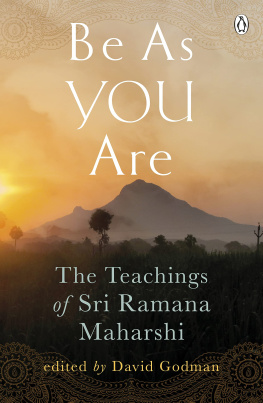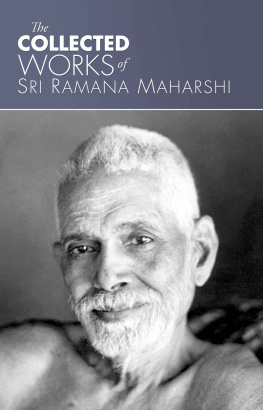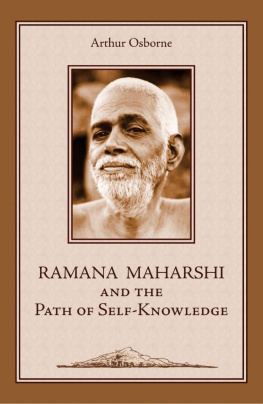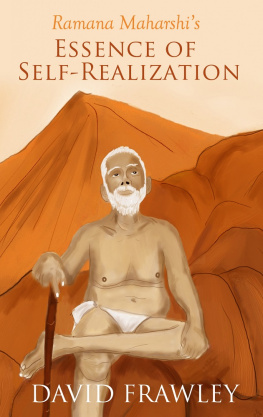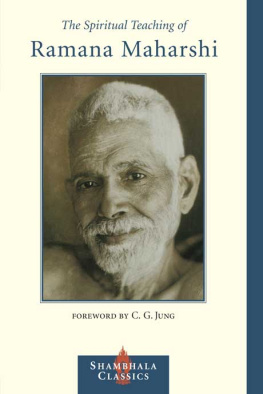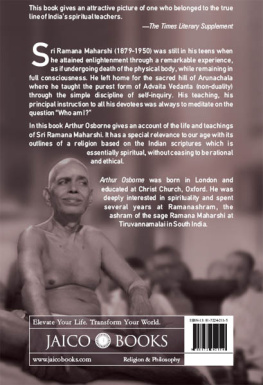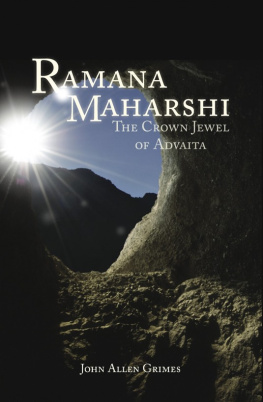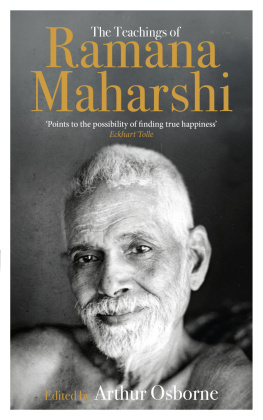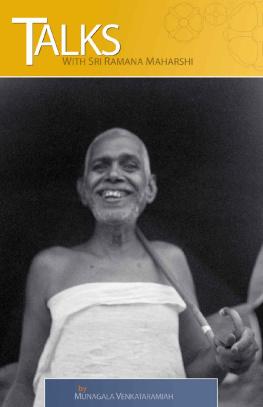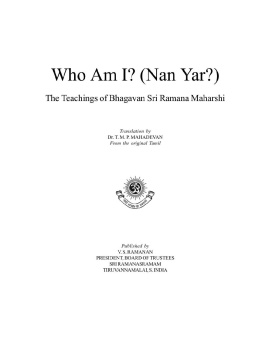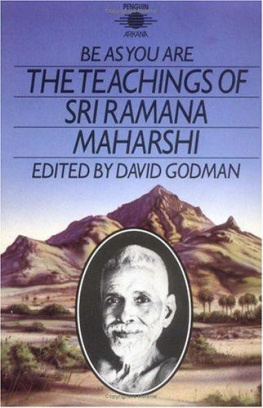Ramana Maharshi was one of the most significant spiritual teachers to emerge from India during the first half of this century, and remains widely admired. This collection of conversations between him and the many seekers who came to his ashram for guidance contains the essence of his teaching.
David Godman has been studying and practising the teachings of Sri Ramana in India since 1976. He is the past librarian of Sri Ramana's ashram and a former editor of The Mountain Path, a journal which propagates Sri Ramanas teachings.
ARKANA
Published by the Penguin Group
Penguin Books Ltd, 80 Strand, London WC2R 0RL , England
Penguin Group (USA) Inc., 375 Hudson Street, New York, New York 10014, USA
Penguin Group (Canada), 90 Eglinton Avenue East, Suite 700, Toronto, Ontario, Canada M4P 2Y3 (a division of Pearson Penguin Canada Inc.)
Penguin Ireland, 25 St Stephens Green, Dublin 2, Ireland (a division of Penguin Books Ltd)
Penguin Group (Australia), 707 Collins Street, Melbourne, Victoria 3008, Australia (a division of Pearson Australia Group Pty Ltd)
Penguin Books India Pvt. Ltd, 11 Community Centre, Panchsheel Park, New Delhi 110 017, India
Penguin Group (NZ), 67 Apollo Drive, Rosedale, Auckland 0632, New Zealand (a division of Pearson New Zealand Ltd)
Penguin Books (South Africa) (Pty) Ltd, Block D, Rosebank Office Park, 181 Jan Smuts Avenue, Parktown North, Gauteng 2193, South Africa
Penguin Books Ltd, Registered Offices: 80 Strand, London WC2R 0RL , England
www.penguin.com
First published by Arkana 1985
Copyright Sri Ramanasramam, 1985
All rights reserved
ISBN: 978-0-141-93538-6
Introduction
In 1896 a sixteen-year-old schoolboy walked out on his family and, driven by an inner compulsion, slowly made his way to Arunachala, a holy mountain and pilgrimage centre in South India. On his arrival he threw away all his money and possessions and abandoned himself to a newly-discovered awareness that his real nature was formless, immanent consciousness. His absorption in this awareness was so intense that he was completely oblivious of his body and the world; insects chewed away portions of his legs, his body wasted away because he was rarely conscious enough to eat and his hair and fingernails grew to unmanageable lengths. After two or three years in this state he began a slow return to physical normality, a process that was not finally completed for several years. His awareness of himself as consciousness was unaffected by this physical transition and it remained continuous and undimmed for the rest of his life. In Hindu parlance he had realised the Self; that is to say, he had realised by direct experience that nothing existed apart from an indivisible and universal consciousness which was experienced in its unmanifest form as beingness or awareness and in its manifest form as the appearance of the universe.
Normally this awareness is only generated after a long and arduous period of spiritual practice but in this case it happened spontaneously, without prior effort or desire. Venkataraman, the sixteen-year-old schoolboy, was alone in an upstairs room of his uncle's house in Madurai (near the southern tip of India) when he was suddenly gripped by an intense fear of death. In the following few minutes he went through a simulated death experience during which he became consciously aware for the first time that his real nature was imperishable and that it was unrelated to the body, the mind or the personality. Many people have reported similar unexpected experiences but they are almost invariably temporary. In Venkataraman's case the experience was permanent and irreversible. From that time on his consciousness of being an individual person ceased to exist and it never functioned in him again.
Venkataraman told no one about his experience and for six weeks he kept up the appearance of being an ordinary schoolboy. However, he found it an increasingly difficult posture to maintain and at the end of this six week period he abandoned his family and went directly to the holy mountain of Arunachala.
The choice of Arunachala was far from random. Throughout his brief life he had always associated the name of Arunachala with God and it was a major revelation to him when he discovered that it was not some heavenly realm but a tangible earthly entity. The mountain itself had long been regarded by Hindus as a manifestation of Siva, a Hindu God, and in later years Venkataraman often said that it was the spiritual power of Arunachala which had brought about his Self-realisation. His love for the mountain was so great that from the day he arrived in 1896 until his death in 1950 he could never be persuaded to go more than two miles away from its base.
After a few years of living on its slopes his inner awareness began to manifest as an outer spiritual radiance. This radiance attracted a small circle of followers and, although he remained silent for most of the time, he embarked upon a teaching career. One of his earliest followers, impressed by the evident saintliness and wisdom of the young man, decided to rename him Bhagavan Sri Ramana Maharshi Bhagavan means Lord or God, Sri is an Indian honorific title, Ramana is a contraction of Venkataraman and Maharshi means great seer in Sanskrit. The name found favour with his other followers and it soon became the title by which he became known to the world.
At this stage of his life Sri Ramana was speaking very little and so his teachings were transmitted in an unusual fashion. Instead of giving out verbal instructions he constantly emanated a silent force or power which stilled the minds of those who were attuned to it and occasionally even gave them a direct experience of the state that he himself was perpetually immersed in. In later years he became more willing to give out verbal teachings, but even then, the silent teachings were always available to those who were able to make good use of them. Throughout his life Sri Ramana insisted that this silent flow of power represented his teachings in their most direct and concentrated form. The importance he attached to this is indicated by his frequent statements to the effect that his verbal teachings were only given out to those who were unable to understand his silence.

